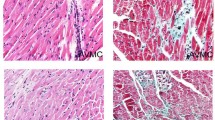Abstract
CD4 T cells are suspected to play an important role in the pathogenesis of dilated cardiomyopathy (DCM). This study sought to evaluate whether anti-L3T4 monoclonal antibody (McAb) could induce the infectious tolerance to the adenosine diphosphate (ADP)/adenosine triphosphate (ATP) carrier peptides to protect mice from DCM. BALB/c mice (n = 16) were immunized with the peptides derived from human ADP/ATP carrier on the 1st, 14th, 28th, 49{th}, and 79th days, and some of them (n = 6) were also injected with anti-L3T4 McAb on the −1{st}, 0, and 1st days. On the 180th day, the splenocytes (SC) from the McAb-treated group were transferred into the syngeneic recipients (n = 6) who were also immunized with the peptides in the same manner. The sham-immunized mice were taken as the controls (n = 10). Results showed that the serum antibody against the ADP/ATP carrier examined with ELISA was positive in all mice only immunized with the peptides (DCM group), while negative in the McAb-treated, the SC-transferred, and the Control groups. The mRNA expression of IFN-γ, IL-2, and IL-4, especially IL-4 in T cells investigated using real-time quantitative PCR and the percentages of T helper 1 (Th1) and Th2 subsets, especially Th2 subset detected with Flow Cytometry were all increased in DCM group, accompanied by the cardiac histopathological changes like those in DCM. Such findings were not seen in the other three groups. It concluded that anti-L3T4 McAb could inhibit the occurrence of DCM induced by the ADP/ATP carrier peptides in mice, and this immune tolerance could be transferred to the syngeneic recipients.
Similar content being viewed by others
Abbreviations
- DCM:
-
dilated cardiomyopathy; ADP, adenosine diphosphate; ATP, adenosine triphosphate; McAb, monoclonal antibody; SC, splenocytes; Th1, T helper 1; FA, Freund’s adjuvant; FBS, fetal bovine serum; ConA, concanavalin A; VG, Van-Gieson; OD, optical density; LV, left ventricle.
References
Schultheiss HP, Schwimmbeck P, Bolt HD, Klingenberg M: The antigenic characteristics and the significance of the adenine nucleotide translocator as a major autoantigen to anti mitochondrial antibodies in dilated cardiomyopathy. Adv Myocardiol 6:311–327, 1985
Iwata M, Yoshikawa T, Baba A, Anzai T, Mitamura H, Ogawa S: Autoantibodies against the second extracellular loop of beta1-adrenerrgic receptors predict ventricular tachycardia and sudden death in patients with idiopathic dilated cardiomyopathy. J Am Coll Cardiol 37:418–424, 2001
Fu ML, Schulze, Wallukat G, Hjalmarson A, Hoebeke J: A synthetic peptide corresponding to the second extracellular loop of the human M2 acetylcholine receptor induces pharmacological and morphological changes in cardiomyocytes by active immunization after 6 months in rabbits. Clin Immunol Immunopathol 78:203–207, 1996
Liao YH, Fu M: Autoimmunity in the pathogenesis of cardiomyopathy. J Autoimmun 16:1–2 2000
Schutheiss HP, Bolte HD: Immunological analysis of autoantibodies against the adenine necleotide translacator in dilated cardiomyopathy. J Mol Cell Cardiol 17:603–617, 1985
Liao YH, Cheng LX, Da SP: Autoantibodies against ADP/ATP carrier from patients with dilated cardiomyopathy increase activity of voltage-dependent Ca channels in isolated cardiac myocytes. Blood Press Suppl 3:41–44, 1996
Schulze K, Becker BF, Schauer R, Schultheiss HP: Antibodies to ADP-ATP carrier—An autoantigen in myocarditis and dilated cardiomyopathy—impair cardiac function. Circulation 81:959–969, 1990
Gutstein NL, Seaman WE, Scott JH, Wofsy D: Induction of immune tolerance by administration of monoclonal antibody to L3T4. J Immunol 137:1127–1132, 1986
Lehmann M, Graser E, Risch K, Hancock WW, Muller A, Kuttler B, Hahn HJ, Kupiec-Weglinski JW, Brock J, Volk HD: Anti-CD4 monoclonal antibody-induced allograft tolerance in rats despite persistence of donor-reactive T cells. Transplantation 64:1181–1187, 1997
Kurasawa K, Sakamoto A, Maeda T, Sumida T, Ito I, Tomioka H, Yoshida S, Koike T: Short-term administration of anti-L3T4 McAb prevents diabetes in NOD mice. Clin Exp Immunol 91:376–380, 1993
Kong YM, Giraldo AA, Waldmann H, Cobbold SP, Fuller BE. Resistance to experimental autoimmune thyroiditis: L3T4+ cells as mediators of both thyroglobulin-actived and TSH-induced suppression. Clin Immunol Immunopathol 51:38–54, 1989
Wofsy D, Seaman WE: Reversal of advanced murine lupus in NZB/NZW F1 mice by treatment with monoclonal antibody to L3T4. J Immunol 138:3247–3253, 1987
Yuan HT, Liao YH, Wang Z, Dong JH, Cao LS, Wang ZH, Wang JP, Fu ML: Prevention of myosin-induced autoimmune myocarditis in mice by anti-L3T4 monoclonal antibody. Can J Physiol Pharmacol 81:84–88, 2003
Benjamin RJ, Waldmann H: Induction of tolerance by monoclonal antibody therapy. Nature 320:449, 1986
Qin SX, Cobbold SP, Pope H, Elliott J, Kioussis D, Davies J, H: “Infectious“ transplantation tolerance. Science 259:974–977, 1993
Waldmann H, Cobbold S: How do monoclonal antibodies induce tolerance? A role for infectious tolerance? Annu Rev Immunol 16:619–644, 1998
Kataoka M, Shimizu Y, Margenthaler JA, Landeros K, Otomo N, Flye MW: Transfer of “infectious” cardiac allograft tolerance induced by donor-specific transfusion. Surgery 132:172–176, 2002
Onodera K, Lehmann M, Akalin E, Volk HD, Sayegh MH, Kupiec-Weglinski JW: Induction of “infectious” tolerance to MHC-incompatible cardiac allografts in CD4 monoclonal antibody-treated sensitised rat recipients. J Immunol 157:1944–1950, 1996
Schwimmbeck PL, Bland NK, Schulthesis HP, Strauer BE: The possible value of synthetic peptides in the diagnosis and therapy of myocarditis and dilated cardiomyopathy. Eur Heart J 12(Suppl D):76–80, 1991
Ulett GC, Ketheesan N, Hirst RG: Cytokine gene expression in innately susceptible BALB/c mice and relatively resistant C57BL/6 mice during infection with virulent Burkholderia pseudomallei. Infection Immun 68:2034–2042, 2000
Wilde DB, Prystowsky MB, Ely JM, Vogel SN, Dialynas DP, Fitch FW: Antigen-reactive cloned helper T cells. II. Exposure of murine cloned helper T cells to IL-2-containing supernatant induces unresponsiveness to antigenic restimulation and inhibits lymohokine production after antigenic stimulation. J Immunol 133:636–641, 1984
Mosmann TR, Coffman RL: TH1 and TH2 cells: Different patterns of lymphokine secretion lead to different functional properties. Annu Rev Immunol 7:145–173, 1989
Romagnani S: The Th1/Th2 paradigm. Immunol Today 18:263—266, 1997
Author information
Authors and Affiliations
Corresponding author
Rights and permissions
About this article
Cite this article
Liao, YH., Yuan, J., Wang, ZH. et al. Infectious Tolerance to ADP/ATP Carrier Peptides Induced by Anti-L3T4 Monoclonal Antibody in Dilated Cardiomyopathy Mice. J Clin Immunol 25, 376–384 (2005). https://doi.org/10.1007/s10875-005-4187-y
Accepted:
Issue Date:
DOI: https://doi.org/10.1007/s10875-005-4187-y




